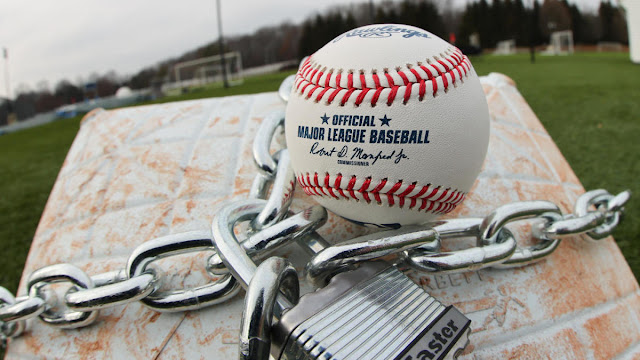 |
| The 2022 MLB Lockout has Rob Manfred's name all over it. |
I typically stay out of the business side of sports. If anything, I have a more pragmatic side than most fans. Example, when someone on your team (e.g. Albert Pujols) that you belove is at a priced out of the value point, your team is better off to let him or her go (e.g. St. Louis Cardinals). Fans scream "how could you." I scream, "you had to."
For the unfortunate and, in my opinion, avoidable 2022 MLB lockout, I don't blame owners or players for fighting to maximize their profit from the game, that's what they should do. Owners have the right to lock out and cancel games as leverage. Honestly cancelling games has been a single thing that has brought about progress.
But players have the right to not agree to things they think is unfair (early career salaries, a de facto cap, manipulating player seniority) and wait them out. They are the stars and should get a good portion of the proceeds. So let's get past taking sides.
The rub is that it comes at the expense of the source of revenue and there is collateral damage. The fans. Each of the professional sides is calculating that damage and using it as a bargain to gain leverage instead of treating it as an eroding commodity.
 |
| MLB Fans Patience is being tested. Again. |
In other words, owners think players surely have to concede because they don't want to appear as petulant and probably need the income. We can wait them out.
Players think, no way owners can keep this up, they look horrible. Especially if we tweet about it a lot. Look a Twitter poll favors us. They'll cave.
And here we are.
The overall negotiations are toxic. I recall it was described by media as relatively negotiable issues (dividing up slices of the pie, not fundamentally changing the state of the game) coming into it. Nothing like 1994 in which there were chasms to bridge (drug testing, a recent collusion conviction, etc.). But now, we're talking universal DH, raise the minimums and caps, then sort out minor details like size of bases and playoff teams and pitch clocks in the process. Then as things progressed, it just seemed to spiral downward and it was baffling.
I blame Rob Manfred.
Not necessarily because as the owners' negotiator he's not been giving a reasonable deal I'm not counting dollars. In fact, there were times the owners would move the needle and the players would just walk away without further discussion "unimpressed". As if they were entitled.
I blame Manfred for the tone of these negotiations. A leader leads by getting his point across firmly, but listening and making the other side feel heard. Finding ways to make sure things move forward. I've heard nothing but the opposite. We take one step forward and three steps back because players feel mistreated and unheard. It's on him to ensure that doesn't happen.
 |
| MLB Commissioner Rob Manfred has failed the game |
There were ways to approach this in which the tone of the negotiations were set prior to a head. Set the stage with "here's the things we're thinking, what are you thinking?" Okay, let's put that aside and get to the numbers later. Instead it seemed like Manfred just thought they would come in with the rule of law and players would have to agree. Nope. And players were right to stand up. He's really failed the owners.
A good leader removes barriers to ensure customers get their product and Manfred has done the opposite.
As I said, I don't care who gets the bigger piece of the pie. They'll both get pie. I just want there to be a pie. It's the commissioner's job to ensure it happens. And he's failing. Miserably.
No comments:
Post a Comment